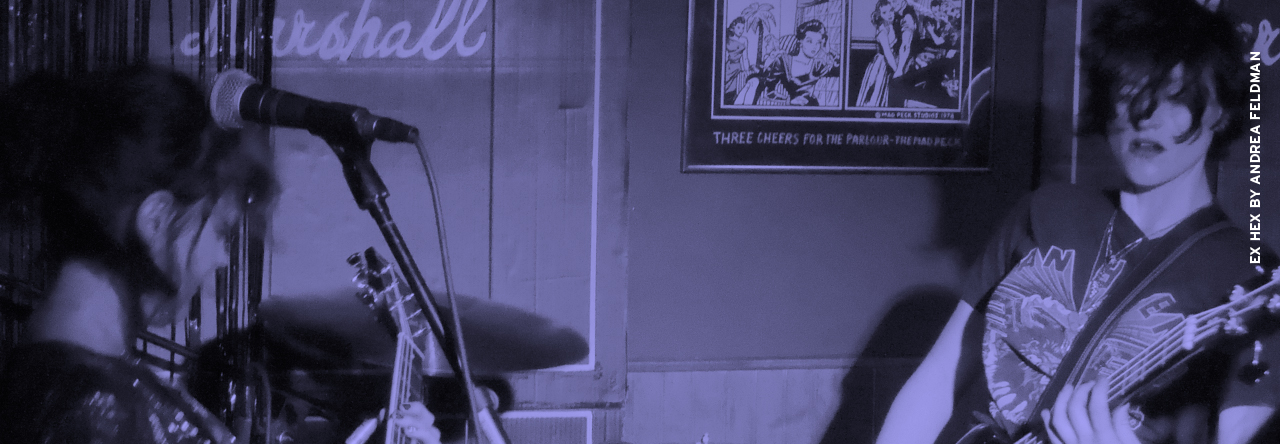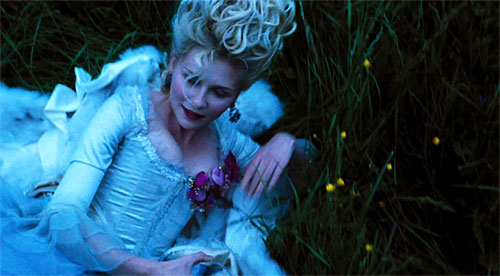Sofia Coppola’s new film Marie Antionette opens with Gang of Four’s spiky, anthemic “Natural’s Not In It” —talk about an audacious opening salvo. The song’s lyrics cut through the ridiculous, rococo overindulgence of the mise en scène, offering a tacit, taunting indictment of the titular Queen and indeed, of her entire court: “The problem of leisure/What to do for pleasure…” The lyrics —spit out in short, caustic bursts while Dunst’s child queen, playing dress-up for the camera, winks and lolls seductively— momentarily cast her in a critical light, underscoring her come-hither silliness and fatally unreflective self-indulgence with critical, wounding ripostes: “Your relations are all power/we all have good intentions/but with strings attached. “ By the time the song reaches its apex, denoted by the repeated refrain“dream of the perfect life,” I’m filled with hope that I’d been wrong about the film looking like the thinnest of tissue-thin fripperies. With Gang of Four deployed so cannily early on, I dearly hope that the rest of the film —and its playfully anachronistic soundtrack—will follow suit, deftly skewering the excess on display.
Alas, starry-eyed Coppola’s no Derek Jarman. Warning bells go off as soon as an early, moving scene of the young, unhappy child bride breaking down into fitful sobs is followed toot-sweet with a gaudy, cloying scene of court gluttony scored unironically with —you guessed it— Bow Wow Wow’s “I Want Candy.” Good-bye, emotional involvement, hello music video!
Taken on its own merits (ie, as a lush, gorgeously art-directed music video) the film works surprisingly well. Ask for anything more than puddle-deep, however, and you soon realize that the film’s tone veers dangerously close to a mash-note from one idle-rich director to her peeps. (From Louis XVI to Louis Vuitton !) Although the endless scenes of gluttony and excess began to curdle for me well before the peasants stormed the Bastille, Coppola’s camera takes a fairly neutral view. Her authorial intent is as muted as Dunst’s curiously flat, California-drawled dialogue.
A disappointment, all things considered.
But what a soundtrack.
PS: I want the string version of “Hong Kong Garden” that’s featured in the movie! Anyone?
PPS: Throwing some non-soundtrack Adam and the Ants in there for good measure.
Buy the soundtrack. | David Allen [Gang of Four] | Gang of Four | Siouxsie & Budgie| Adam Ant.net |Neworderonline
![]() Gang of Four “Natural’s Not In It”
Gang of Four “Natural’s Not In It”
![]() Siouxsie & the Banshees “Hong Kong Garden”
Siouxsie & the Banshees “Hong Kong Garden”



cindy hotpoint
The stringy version is on the soundtrack album… (:
cindy hotpoint
Actually, I just realized, this may be the only space — and you may be the only person I can totally discuss this with!
I found the film to be the next installment in the Sofia Coppola story (you know, the sisterly sequel to Virgin Suicides and Lost in Translation) — not necessarily the tacky mash note of the idle rich that you mention. It’s more like we found out what it’s like to be publicly ridiculed and despised by people you don’t know for things you’ve never done — just because of where you come from, or who your parents are, or what kind of failed princess they make you into.
The thing is, Sofia’s getting to write her ending, Marie Antoinette didn’t have that opportunity. Which, I think, is why the film ends where it does. I don’t think this very broadly drawn allegory is particularly tacky or our of line of Coppola. (And of course, this allegory gets even more meta and convoluted and slippery when you look at the role she cast Asia Argento in!) The only reason we remember Marie Antoinette is that she’s attributed for saying something she didn’t, sparked a revolution for it, and lost her head.
There’s bits lots of bits of Sofia floating around, the bits we didn’t get in Lost In Translation — you wonder if, for instance, when she met Thomas Mars — was it like when Fersen first sees Marie Antoinette at the hipster party, uh, I mean, masked ball? Wanna bet she totally indulged in compulsive buying when she was unhappy with Spike Jonze? Just a thought…
cindy hotpoint
Last comment — I promise, you know how flighty I am!
Someone saw Orlando, that’s for sure!!!
And, you know, it’s okay that Sofia’s no Jarman — one of him is totally plenty for me. And he’s never shot a minute and a half of film that affected me as deeply as the crush-addled ride back to Versailles after the masked ball — or the shallow, melancholic glitter of the coronation scene — or yeah, the decadent desparation of the “I Want Candy” sequence. Jarman’s brilliant, but just as Coppola’s experience informs her work and makes them warm and accessable to me, much of what Jarman puts of himself in his films are things I can never experience, and I can’t help but feel at arm’s length from a lot of his work, beautiful though it is.
Andrea
You’re right about Jarman —he’s incisive, but prickly and stand-offish — all sharp angles. Coppola’s work has none of that. I think sometimes I recoil from her work because of it —it almost seems suffocating to me at times. On the other hand, to Marie Versailles IS a cloying and suffocating prison, so if it seemed as such to me then her point was made all too well.
I read an interview with Coppola somewhere where she mentioned that early on she almost made the film silent. I think she could have, so broadly does she telegraph Marie’s emotional state throughout the film. One of the most successful scenes, for me, was when Marie finally stood before the angry mob and made that deep, graceful bow to them. It was such an underplayed, eloquent moment that said everything it needed to about the naïve young girl finally assuming the mantle of Queen.
Maybe, on reflection, I underestimated the film. I was definitely impatient with it —with the prettiness, the thinness of the script and the performances (Dunst hitting her marks about half the time, Schwartzman underplaying and Rip Torn overdoing it to compensate). But when I let go of my own inner kvetcher, I really enjoyed myself. As a spectacle it was hugely entertaining.
I also think that Coppola finds reserves of emotional resonance when she’s not trying too hard —as in that lovely scene in the carriage post-masked ball. The “I Want Candy” scene fell flat for me precisely because it was so self-conscious, almost flippant —and it drew flippancy from me in return. By then film’s end, though, I think she’d settled in to more comfortably and consitently to her own emotional tone, because I started to feel much more satisfied by the film at that point. Dunst’s “I’m saying goodbye” felt real and hard-won, not cheap.
Thanks for responding so thoughtfully! I haven’t answered in as much depth as I could, really —perhaps I’ll have more thoughts when I see the movie again.
jon
Here’s a link to the sdtrk version of Hong Kong Garden:
http://ditchingboy.blogspot.com/2006/10/marie-antoinette-soundtrack.html
Andrea
Thanks Jon!
Oh, your CDs were sent out yesterday from NYC. Let me know when they get there safely!
Dave Allen
thanks for the post (I still haven’t seen the movie in its entirety) but there’s a slight lyrical typo…
Andrea writes “By the time the song (Natural’s Not In It) reaches its apex, denoted by the repeated refrain “dream of the puppet life,” er, that would be “dream of the perfect life”
Dave
Andrea
Oh, my, that is so incredibly embarrassing! Serves me right for posting late at night and not proofing it properly! I shall amend it ASAP!
Thanks!!
-Andrea